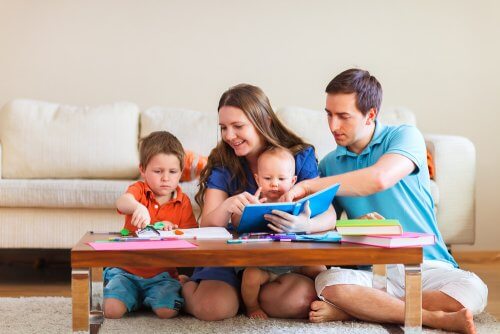The Importance of Parenting as a Team


Written and verified by the social educator Natalia Cobos Serrano
Being a parent isn’t easy. Caring for and educating a child is a major responsibility that requires a great deal of work and consistency. However, when parents are able to work together, it makes a huge difference. Not only does it ease the load for mom and dad, but it’s also very beneficial for children. Today, we’ll talk about the importance of parenting as a team.
Why is parenting as a team so important?
The benefits that you obtain when you work together with your partner to care for and educate your children are infinite. Being able to depend on one another, making joint decisions, coming to a mutual agreement on how you want to raise your family… All of these aspects have a positive impact on your children and will strengthen the relationship between you and your partner as well.
At the same time, in the case of families where parents are separated, parenting as a team continues to be fundamental. In fact, it becomes even more important. The children of separated parents need consistency and coherence, which they can only get if their parents agree to focus their child-raising in the same direction.
“Alone we can do so little, together we can do so much.”
– Helen Keller –

When parents work as a team, this has a direct positive impact on the self-esteem of their children. In other words, when parents work together to raise their children, this gives them a greater sense of confidence. And that confidence not only applies to themselves, but also to the relationships they establish with others.
According to research conducted by psychologists Gordon Harold and Ruth Sellers, witnessing arguments and fights between parents negatively impacts children. In fact, they can lead to hormonal imbalances, anxiety, depression, behavior problems, and delays in brain development.
“Arguments between partners are inevitable in any family, but it’s important to handle them in the correct way to keep our children from suffering the consequences.”
– Nacho Meneses –
Strategies
- Mutual respect. This goes beyond appreciating and valuing one another’s opinions and attitudes. It’s also about never undermining your partner’s authority in front of your children.
- Propose solutions. In other words, know how to develop different abilities when it comes to conflict resolution. This means acquiring a positive and collaborative attitude and seeking out alternatives and solutions to problems and conflicts.
- Take care of your relationship, even if you and your children’s father/mother are no longer together. Parents that respect one another and maintain a good relationship with one another create and solidify a healthy home environment.

- Manage your emotions. Good intentions are useless if you lose your cool as soon as something goes wrong. Knowing how to manage your emotions in the midst of tense situations will help calm your environment. What’s more, it will help you make better decisions.
- Support one another. One of the keys to parenting as a team is that parents support one another. This includes everything from making simple decisions to handling problematic situations.
How does parenting as a team benefit parents?
In conclusion, the way that parents handle raising their kids and how they interact with one another has a tremendous impact on their children. That’s a fact. Little ones that grow up in a home where parents support one another, make decisions together, and share a common vision grow up happier and healthier.
Without a doubt, parents who act coherently and consistently promote a greater sense of security and confidence in their children and teens. And, at the same time, they strengthen family bonds.
“The best security blanket a chid can have is parents who respect each other.”
– Jane Blaustone –
Being a parent isn’t easy. Caring for and educating a child is a major responsibility that requires a great deal of work and consistency. However, when parents are able to work together, it makes a huge difference. Not only does it ease the load for mom and dad, but it’s also very beneficial for children. Today, we’ll talk about the importance of parenting as a team.
Why is parenting as a team so important?
The benefits that you obtain when you work together with your partner to care for and educate your children are infinite. Being able to depend on one another, making joint decisions, coming to a mutual agreement on how you want to raise your family… All of these aspects have a positive impact on your children and will strengthen the relationship between you and your partner as well.
At the same time, in the case of families where parents are separated, parenting as a team continues to be fundamental. In fact, it becomes even more important. The children of separated parents need consistency and coherence, which they can only get if their parents agree to focus their child-raising in the same direction.
“Alone we can do so little, together we can do so much.”
– Helen Keller –

When parents work as a team, this has a direct positive impact on the self-esteem of their children. In other words, when parents work together to raise their children, this gives them a greater sense of confidence. And that confidence not only applies to themselves, but also to the relationships they establish with others.
According to research conducted by psychologists Gordon Harold and Ruth Sellers, witnessing arguments and fights between parents negatively impacts children. In fact, they can lead to hormonal imbalances, anxiety, depression, behavior problems, and delays in brain development.
“Arguments between partners are inevitable in any family, but it’s important to handle them in the correct way to keep our children from suffering the consequences.”
– Nacho Meneses –
Strategies
- Mutual respect. This goes beyond appreciating and valuing one another’s opinions and attitudes. It’s also about never undermining your partner’s authority in front of your children.
- Propose solutions. In other words, know how to develop different abilities when it comes to conflict resolution. This means acquiring a positive and collaborative attitude and seeking out alternatives and solutions to problems and conflicts.
- Take care of your relationship, even if you and your children’s father/mother are no longer together. Parents that respect one another and maintain a good relationship with one another create and solidify a healthy home environment.

- Manage your emotions. Good intentions are useless if you lose your cool as soon as something goes wrong. Knowing how to manage your emotions in the midst of tense situations will help calm your environment. What’s more, it will help you make better decisions.
- Support one another. One of the keys to parenting as a team is that parents support one another. This includes everything from making simple decisions to handling problematic situations.
How does parenting as a team benefit parents?
In conclusion, the way that parents handle raising their kids and how they interact with one another has a tremendous impact on their children. That’s a fact. Little ones that grow up in a home where parents support one another, make decisions together, and share a common vision grow up happier and healthier.
Without a doubt, parents who act coherently and consistently promote a greater sense of security and confidence in their children and teens. And, at the same time, they strengthen family bonds.
“The best security blanket a chid can have is parents who respect each other.”
– Jane Blaustone –
All cited sources were thoroughly reviewed by our team to ensure their quality, reliability, currency, and validity. The bibliography of this article was considered reliable and of academic or scientific accuracy.
- Harold, G. y Sellers, R. (s.f.). Family relationship influences on youth mental health. Journal of Child Psychology and Psychiatry. Recuperado de: https://www.bbc.com/mundo/noticias-43618412
This text is provided for informational purposes only and does not replace consultation with a professional. If in doubt, consult your specialist.








